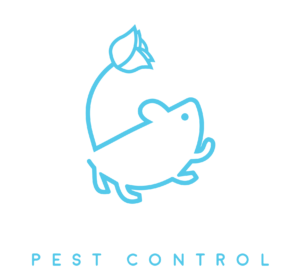Spider Control
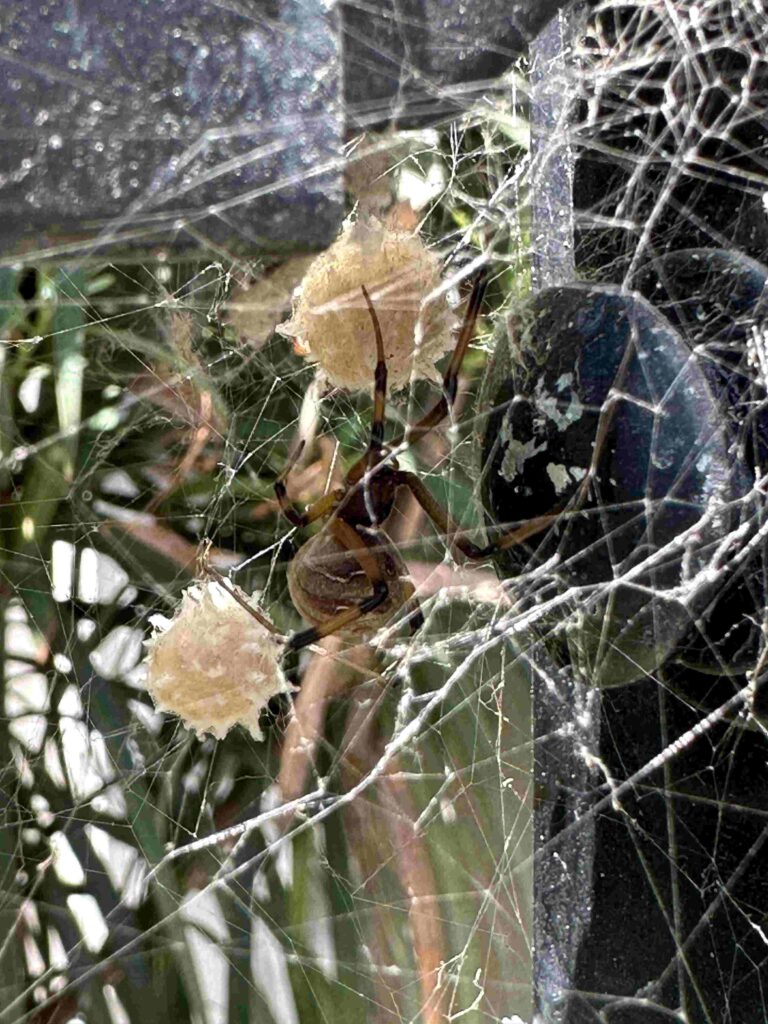
Whether you’re fascinated or terrified, spiders are a fact of life. Some of them are harmless, quietly keeping the insect population in check, while others give us the heebie-jeebies just by being near. Among the many eight-legged creepers, a few stand out locally: the infamous Black Widow, her sneaky cousin, the Brown Widow, the unsettling Noble False Widow, the common House Spiders and the Orb Weavers that take over your walkways, porches, and gardens.
Let’s dive into the fascinating, freaky world of these spiders—why you should care, what danger they pose, and how you can make sure they’re evicted from your home for good.
Brown Widow Spiders: The Sneaky Sister
Less known but equally creepy, the Brown Widow (Latrodectus geometricus) is the more laid-back cousin of the Black Widow. Her body is tan or brown, with orange or yellow hourglass markings. Though her venom is about as toxic as the Black Widow’s, she’s less aggressive and more likely to retreat than bite.
Signs of a Brown Widow Infestation:
- Egg sacs: Brown Widow egg sacs look like spiky little bombs—much different from the smooth sacs of other spiders.
- Hiding spots: Brown Widows like to hide under outdoor furniture, in mailboxes, and under railings. They’ll spin webs in the same cluttered style as their black relatives.
How Dangerous Are Brown Widows?
Brown Widows are considered less dangerous than Black Widows due to their shy nature. Their bites are painful but much less likely to lead to severe reactions. Still, you don’t want these around your home—especially if you have children or pets.
Black Widow Spiders: The Femme Fatale of the Spider World
The Black Widow (Latrodectus mactans) is as iconic as she is feared. Instantly recognizable by her shiny black body and distinctive red hourglass marking, she’s not a spider you want hanging around. Known for her potent venom, the bite of a Black Widow can cause intense pain, muscle cramps, and even more serious symptoms, especially in children and the elderly.
Signs of a Black Widow Infestation:
- Tangled webs: Unlike the orderly webs of orb weavers, Black Widow webs are messy and irregular. You’ll often find them in dark, undisturbed areas like sheds, crawl spaces, garages, or wood piles.
- Spider sightings: Black Widows prefer hiding in dim, quiet places, but if you spot one—stay away! They’ll usually keep to themselves unless threatened.
How Dangerous Are Black Widows?
While their bite is rarely fatal, it’s extremely painful and can lead to medical complications. If bitten, immediate medical attention is necessary. Let’s just say this is one spider you don’t want to mess with.
Noble False Widow: The Unwelcome Lookalike
Often mistaken for its more dangerous cousins, the Noble False Widow (Steatoda nobilis) isn’t as venomous but can still pack a punch. These dark brown or reddish spiders have a bulbous body and a similar hourglass shape, making them a master of deception in the spider world. They’re notorious for moving indoors when it gets cold, making them a potential winter house guest.
Signs of a Noble False Widow Infestation:
- Silken retreats: These spiders weave small, retreat-like webs in window frames, behind radiators, and in loft spaces.
- Spider sightings: If you see a spider that looks like a Widow but doesn’t have the bright hourglass markings, it could be a False Widow.
How Dangerous Are Noble False Widows?
While their bite can be painful, most bites result in mild swelling or discomfort similar to a bee sting. However, there have been some rare cases of more severe reactions. It’s best to keep your distance.

House Spiders: The Homebodies of the Spider World
The common house spider (Parasteatoda tepidariorum) is one of the most familiar faces around. They’re small, unassuming, and mostly harmless. These spiders build their messy webs in the corners of ceilings, basements, and windows, waiting patiently for flies, mosquitoes, and other pests to stumble in.
Signs of a House Spider Infestation:
- Cobwebs: You’ll know a house spider is around when you find its abandoned cobwebs in all the hard-to-reach corners of your house.
- Spider sightings: House spiders are shy but prolific. They often scuttle across the floor when disturbed, but they’re more likely to stay in one spot once they’ve spun their web.
How Dangerous Are House Spiders?
House spiders aren’t dangerous to humans. In fact, they’re more afraid of you than you are of them. Their bite is weak, and their venom isn’t potent enough to harm anything larger than an insect. Consider them free pest control—though their webs are certainly an eyesore!
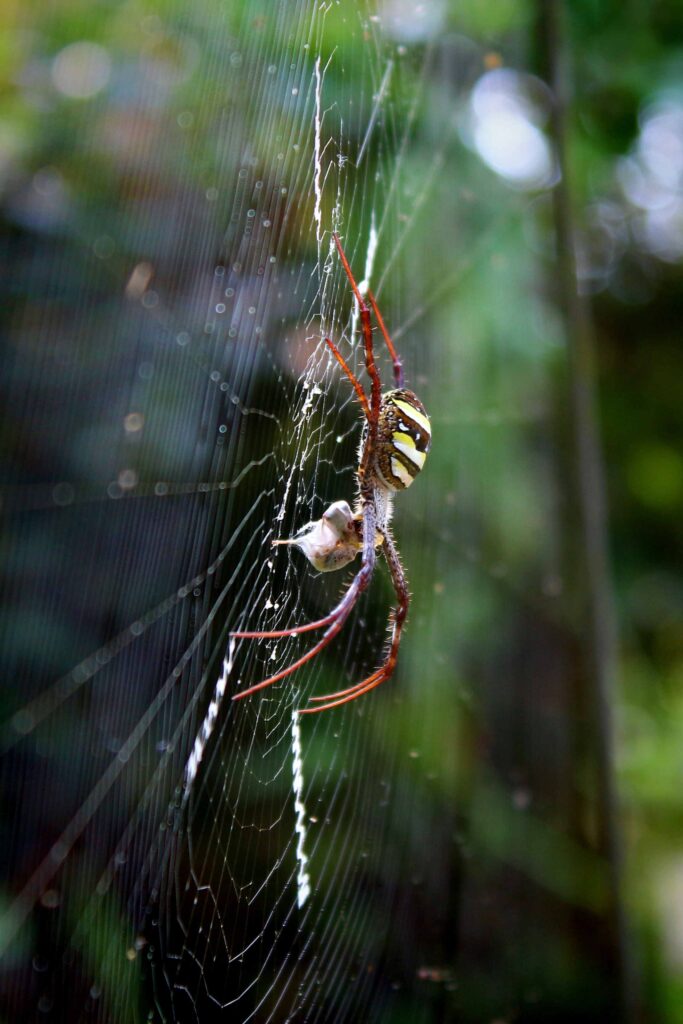
Orb Weavers: The Master Web Designers
Orb Weavers (family Araneidae) are the architects of the spider world. These colorful spiders build the classic spiral-shaped webs you see glistening in gardens and between trees. While they prefer to stay outdoors, they occasionally wander inside during cooler months. With a range of body colors from white to reddish-brown, Orb Weavers are more beautiful than frightening.
Signs of an Orb Weaver Infestation:
- Large, spiral webs: If you’ve walked face-first into a spider web, chances are it belonged to an Orb Weaver. They often spin their webs in high-traffic areas like doorways and windows.
- Spider sightings: These spiders are easily spotted hanging in the center of their web, waiting patiently for prey to wander in.
- Your face is in a web: This spider is infamous for making their webs in places your face is likely to go.
How Dangerous Are Orb Weavers?
Orb Weavers are completely harmless to humans. Their venom is only toxic to the small insects they catch in their webs. In fact, they’re quite beneficial in keeping your garden free from pests.
The One Spider We Don’t Guarantee
The difficulty with Orb Weavers is that they lay their eggs high up in trees, they make their webs in places we often cannot apply arachnicide (eg, gutters, cars, trees 12+ feet up, etc.). Their threads can span from your neighbor’s home to your car handle with their web center unfortunately placed in the center of your walkway, making them one of the most aggravating pests. We kill them with prejudice on site, but they are the one exception to our spider guarantee.
The Real Danger of Spiders in Your Home
Despite their differences, these spiders have something in common—they all share your home because it’s a haven of warmth, food, and shelter. But while some spiders are harmless or even helpful, the risk of dangerous bites, unsightly webs, and the anxiety that comes with unexpected encounters make controlling them a top priority.
- Health risks: Black and Brown Widow bites can cause serious reactions, and even False Widow bites can result in painful swelling.
- Infestation anxiety: Seeing one spider usually means there are more. An infestation can make homeowners feel uneasy, especially when venomous spiders are involved.
- Unwanted webs: House spiders and Orb Weavers spin messy webs that make your home look unkempt, even if they aren’t much of a direct threat.
How Spiders Get Into Your Home
Spiders don’t need much of an invitation to sneak inside. Here’s how they make their way in:
- Open windows and doors: Spiders enter through cracks and gaps around doors, windows, and vents, especially during colder months when they seek warmth.
- Hitchhiking on plants and firewood: Bringing in outdoor plants, firewood, or even boxes from storage can unknowingly transport spiders indoors.
- Existing infestations: Spiders follow food, so if you have a problem with flies, ants, or other insects, spiders will come in to feast on them.
- Gaps, Cracks, Shade, Trees, and Ground Cover
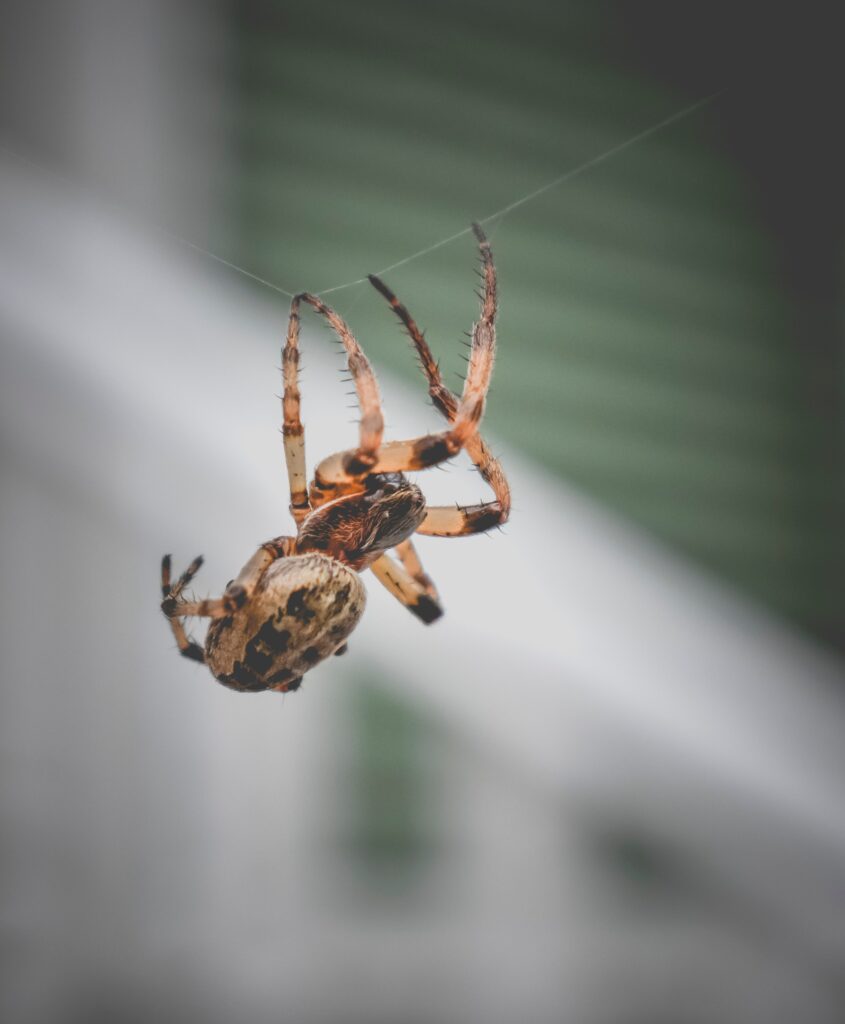
Tips for Spider Control
Want to keep these eight-legged intruders out? Here are some practical tips for keeping your home spider-free:
- Seal cracks and gaps: Prevent spiders from sneaking in by sealing openings around windows, doors, and baseboards.
- Reduce clutter: Spiders love dark, quiet spaces, so keep your home tidy and reduce hiding spots by organizing storage areas.
- Remove egg sacs regularly: Clear all egg sacs. Spider egg sacs can hold over 100 spiderlings within.
- Turn off outdoor lights: Insects are drawn to light, which in turn attracts spiders. Keep your porch lights off when not in use.
- Thorough, Regular Service: Spiders are one of those pests that requires regular and thorough treatments to keep out of the home. Look into our Home Protection Plan for ongoing relief and guaranteed protection.
Why You Should Call the Professionals
While some spiders are helpful, others pose a real threat to your safety and peace of mind. Trying to control venomous spiders like Black or Brown Widows on your own can be risky, especially if the infestation is large or hidden. That’s where Pasadena Pest Control comes in.
Our expert technicians can thoroughly eliminate dangerous spiders from your home, target their hiding spots, and keep them from returning. Whether it’s protecting your family from venomous bites or just reclaiming your space from a web-filled nightmare, we’ve got you covered.
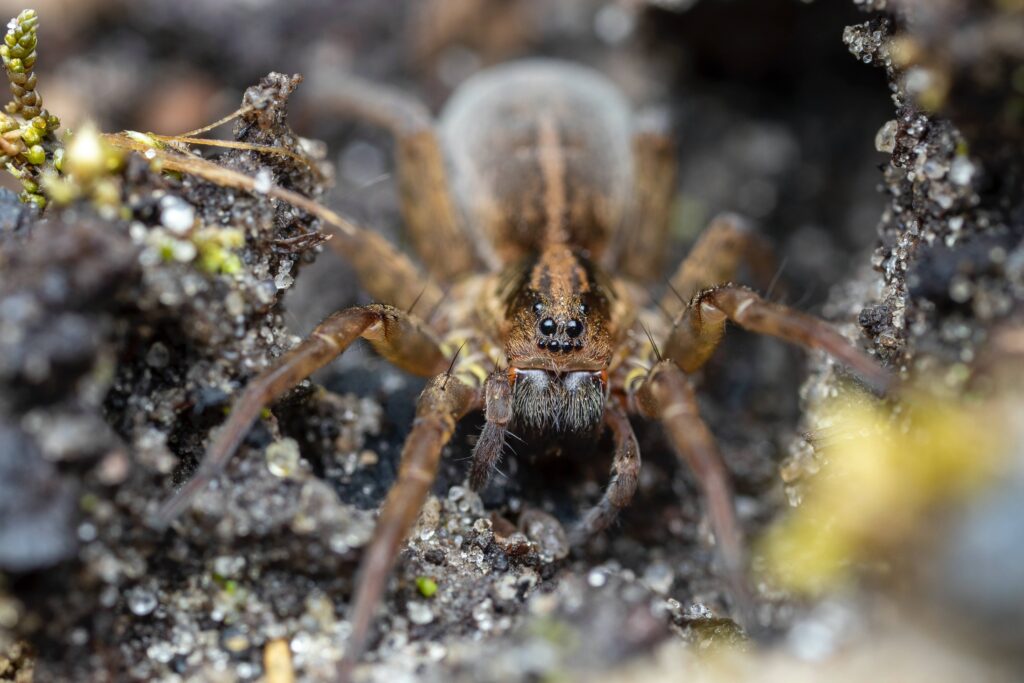
Safety First
“Is it Safe?”
At Pasadena Pest Control, we keep the safety of your family and pets at the forefront of our minds as we plan and work, doing so with minimal disruption to your daily life. We apply chemicals according to the label, which in California is among the strictest and safest in the nation. We take into account your pets and plants, your family and the features specific to your property. At Pasadena Pest Control, we are well-trained on safety procedures, eco-consciousness and educating our customers. And yes, we are licensed, bonded and insured.
When you work with us, you will always know what to expect, how to be prepared, when we are coming, when we’ve started and when we’re done. In short, we provide The Service We’d Want in Your Shoes.
Ready to Reclaim Your Home from Spiders?
Spiders have no place making you feel uncomfortable in your own home. Let Pasadena Pest Control help you take back your space from the webs, the venom, and the unwanted eight-legged surprises. Call us today and tell those spiders to find a new home!
Home Protection Plan
This pest is considered a “General Pest” and is covered under our General Pest Home Protection Plan. For more information on our Home Protection Plan, see here.
Call Pasadena Pest Control—Because Chasing Roaches at 2 A.M. is So Last Season
Let’s face it, chasing down oriental roaches in your basement at midnight is not how you want to spend your time. Call Pasadena Pest Control, and we’ll handle these pests faster than you can say, “Why does my house smell like old gym socks?” Time to get serious about your roach problem—give us a shout today!
Questions Others are asking
We ❤️ love helping new customers! Don’t see your question answered below? Call us and we’ll
be happy to provide more information.
be happy to provide more information.
No, most spiders are harmless and actually help control other pest populations. However, some species like black widows and brown recluses can pose health risks due to their venomous bites.
Spiders typically enter homes seeking shelter, warmth, and food (other insects).
Reduce clutter, vacuum regularly, and seal cracks or gaps around windows and doors. Using essential oils like peppermint can also deter spiders.
